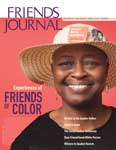At the end of 2013, I posted this question on Facebook, and I received an amazing string of answers. To me such an exercise is powerfully expressive of Quaker faith, which is not doctrinal but expressed in the individual experiences of those who practice. I think these answers together create a lovely poem expressive of the multitude of ways that Quakers understand and experience faith. This compiled selection was originally published on American Friends Service Committee’s Acting in Faith blog (afsc.org/friends). —Lucy Duncan, director of Friends relations for AFSC
- Continuing revelation. Humility. Truth. —Emma Churchman
- Unmediated access to the Divine. —T. Harrison
- I would add: direct, fearless nonviolent action when necessary; consensual process. —Laura Roxanne Seagraves
- There is that of God in everyone. That belief is the primary reason that I became a Quaker and the reason I remain a Quaker. —Marilyn Gilmore
- We can access the voice of the Divine if we wait patiently. In all dealing with people, we use the knowledge of that of God in each and honor it. That leads us directly to the Quaker process that is the core outer example of that inner faith. —Joan Baulch Spinner
- Everyone has direct access to God, but we help each other discern what we hear from that divine presence in community. —Ashley Wilcox
- My own feeling is that nothing could possibly be as important to Quaker faith as the concept of Inner Light. This is a theological innovation which liberated believers from the oppression of the Thou Shalt Nots in the Bible (Protestant tradition) and the Catechism of Mortal Sins (Catholic tradition). Friends believe that the answers to their most pressing issues are ultimately found uniquely in their own hearts. —Mitch Gould
- From an outsider’s perspective? Acceptance. —Martin Magnuson
- For me it’s the silence and the waiting and the discerning what the Spirit is saying and then acting on it. —Edy Nolan
- Openness to the Spirit and to love. Keeping the testimonies growing in our hearts and not reaching for the shorthand. Openness to the possibility that, despite believing in divine guidance, we make mistakes and are not always right. —Ruth A. Seeley
- Unmediated access and God in everyone. —Sharon Smith
- Metaphorically, the overlapping of circles (like those from raindrops falling on a calm pond) between us and God . . . we are a little in God and God a little in us and where the twain meets, light blossoms. —Bill Powell
- That every man, woman, and child on this planet has direct access to divine love, presence, and guidance—and if we listen closely to this still, small voice, we can heal ourselves, our families, our communities, and our world. —Steve Chase
- God is with us, helps, leads, and comforts us, if we are willing to stay in touch. —Margaret Katranides
- LOVE. —Jada Jackson
- The power of kindly attention. —Dave Schoen
- Truth and integrity (truth to self) are what we seek. When truth within matches truth without, we are expressing that which is whole within us. It is then that we are most free: willing to be and do what God [Logos] [the Way] wills us to be and do, rather than reacting out of habit, past wounds, and unexamined cultural norms. —La Verne Maria Shelton
- “Christ has come to teach his people himself.” —George Fox . . . This is the power and subversive simplicity of Friends faith and practice. —Johan Maurer
- We can be true to our Inner Light on our own, but we need a covenant community to really find ourselves and discern our work in the world. —Kate DeRiel
- I’ve been creeping out of the closet door on this one for some time . . . coming out in the Society of Friends on other issues has already put me on the margins of this religion. So what’s one more? The core of Quakerism for me is Jesus. Quaker tradition is very important to me, and I am part of a Quaker community, and I practice Quaker disciplines; my primary self-understanding is not as a Quaker, but as a follower of Jesus of Nazareth. —Paul Ricketts
- To walk (not run) cheerfully (and lightly) on the earth, seeking and acknowledging that of God in every person and all of creation in patient expectation of continuing revelation. (Wish that I could do it!) —Kathy Hersh
- There is that of God in all living beings, which informs how we relate to other beings. It also leads to the idea of ongoing revelation. It feels like all else Quakers hold important flows from that. —Martha Yager
- The work of the Spirit in everyone, and every moment, for Truth and Love, even when we humans don’t see it. —Helen Bayes
- The experience of shared union with the Divine through meeting for worship. —Vonn New
- What’s at my core is a desire to live as much in alignment with primitive Christianity as possible—to seek to live the essence of being Christian, without giving primacy to the rules that church and society have built around Christianity. My faith is anchored in Jesus’s teaching, and I believe that people with other faith systems (non-Christian) are as able to be in communion with God as I am. My faith is Christian and my practice is Quaker. —Kathleen Karhnak-Glasby
- I experience, in these times, G!d’s primary revelation as the universe itself. The story the universe is telling is one of creativity, a bending toward diversity, complexity, and love . . . none of this is in contradiction to Christianity, especially primitive Christianity—or any of the deepest core understandings of the major religions. To be Quaker is to honor this experience and to be in dialogue with other people’s experience. —Amy Kietzman
- The practice of turning attention inwardly to know God’s presence and peace and to listen for truth so that we may be guided by continuing revelation. —Melanie Douty-Snipes
- That of God in each of us, working toward Unity. —Philip Balcombe
- What is a Quaker? Someone who believes in life before death. —Paul Ricketts




Comments on Friendsjournal.org may be used in the Forum of the print magazine and may be edited for length and clarity.